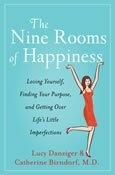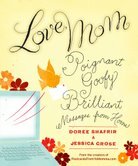 Giveaway has ended, but enjoy the author interview! Are you happy, girlfriend? Why the heck not? Are you letting the little things get in the way? According to a new book, women tend to let their momentary mistakes overshadow their episodes of excellence, until self-doubt shakes the foundation of even the happiest life. Unfortunately, this is the way many women think about everything—their love lives, their friendships, their bank accounts, their family life, their career, and their body image.
Giveaway has ended, but enjoy the author interview! Are you happy, girlfriend? Why the heck not? Are you letting the little things get in the way? According to a new book, women tend to let their momentary mistakes overshadow their episodes of excellence, until self-doubt shakes the foundation of even the happiest life. Unfortunately, this is the way many women think about everything—their love lives, their friendships, their bank accounts, their family life, their career, and their body image.
Lucy Danziger, editor in chief of Self, and Catherine Birndorf, a psychiatrist and expert on women’s mental health issues, teamed up to write The Nine Rooms of Happiness: Loving Yourself, Finding Your Purpose, and Getting Over Life’s Little Imperfections. (Voice; March 2, 2010; $24.99). In it, they use the simple metaphor of a house to illustrate the central problem: when women should be grateful for what they have in their lives in the room at hand, they are either seeing the room’s imperfections or, worse, worrying about another room. The book takes women through different parts of their lives (homes), helps them understand their patterns, and gives them new ways of thinking to solve their own problems. You can find out much more about the book, the authors, and the nine rooms at www.ninerooms.com
And guess what? One whole room (chapter) is devoted to women’s friendships! So, of course, we had to find out more, because who doesn’t want to be happier? Here’s our exclusive Q&A with the authors. Scroll to the end to find out how you can win a FREE copy of the book.
Q. Let’s talk about friendship. Why is friendship The Living Room? How is it connected to the other emotional rooms?
A. The living room is where all your socializing takes place. It’s where you interact with your neighbors, your friends, where you entertain and throw parties, and where you end up comparing yourself to other women, for better or worse.
How you behave in the living room is not exactly how you behave in other emotional areas of your life…you’re typically on “good” behavior, trying to look and act your best and put forward your social self…but this doesn’t always equate with how you feel on the inside. Many women feel insecure in this social arena, and it can come from feeling like a nerd as a high-schooler (these memories are stored in the basement) or being more concerned about how you look in your jeans instead of who you are talking to (body image belongs in the bathroom).
Q. Why is female friendship so important?
A. We know from extensive research that strong social ties can make you healthier and happier. The more connected you are to your community, and the happier you are, the healthier you are. The two are connected. So keep those friendships intact, for their sake and yours!
Q. What are some of the most common problems or issues women have with friendship?
A. From the women we spoke to for our book, and we interviewed hundreds, we found that saying “no” was a major struggle. Women seem hard-wired to help, to give and to do it at their own expense. This is where our key process: too much of a good thing is a bad thing… So the takeaway message here, or “pearl” is: you have to know your limits.
Having limits and sticking to them is essential. Women can feel selfish when they say “No, sorry, can’t help out today,” or I have to cancel because I am totally worn out, but in fact, we tell women in the book that this isn’t selfish, it’s self preservation. You simply have to take care of yourself…because only then can you be healthy and happy and giving to those around you, including being a good friend. BTW, this is why we sometimes call the living room, the “giving room”.
Q. How can we be happier in regard to friendship?
A. Many women believe that a happy friendship is one without conflict. We hear lots of women say they don’t like to disagree with their friends. They believe that really close friendships should always run smoothly. But this may be because you are smoothing over differences or issues that actually need to be discussed. If you don’t figure out how to disagree or tolerate a difference of opinion, you can end up with lots issues getting swept under the rug. And then the rug or the atmosphere in the living room becomes problematic, bumpy, or messy, since always avoiding conflict leads to a whole new problem!
One of our favorite key processes in the book is: “It’s not Either/or, .. instead think Both/and”… which means that you can be both best friends and disagree on something. In other words, conflict is okay. (We love our siblings and often disagree with them… sometimes our gal pals become surrogate sisters, but the fights are uncomfortable because unlike the family room, where everyone has to love each other no matter what, girlfriends can choose to break up or move apart, and that often happens because there’s a breakdown in communication. You have to tell each other when you’re upset. (For friends who are different and disagree, but love each other through thick and thin, think of the great movie and TV rolls where the conflict is played out in dialogue, like in Sex and the City or Friends!) But you may have to learn to live with a little discomfort in the name of a healthier and ultimately happier friendship!
Q. What is your favorite thing to do with girlfriends?
CB: Almost anything that involves talking…especially sharing a cup of tea or taking a long walk.
LD: I talk with my best friends too, but usually it’s either while we exercise or while we eat! I do different things with different people, so it’s often their call.
Lucy Danziger has been editor-in-chief of Self magazine for over eight years. Catherine Birndorf, M.D., is a psychiatrist and the founding director of the Payne Whitney Women’s Program at New York-Presbyterian Hospital/Weill Cornell Medical Center. Both women live in New York City.
And now for the giveaway
You have TWO chances to win a free copy of The Nine Rooms of Happiness, courtesy of Hyperion Voice. Read the rest of this entry »














